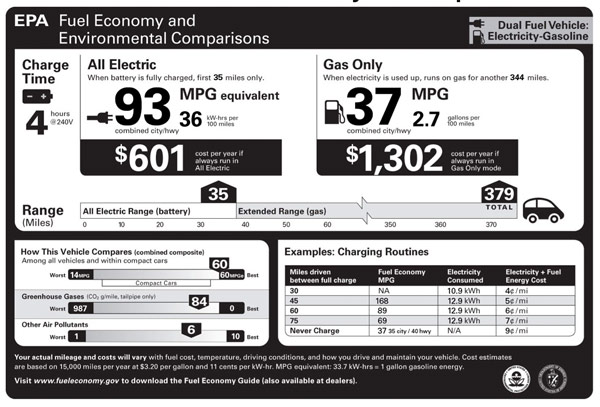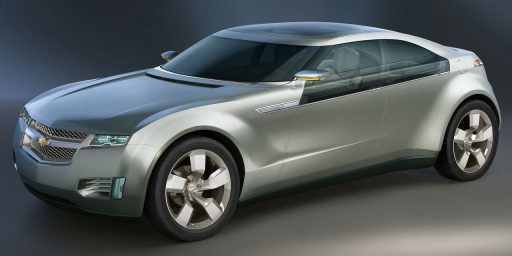37?!?
The much-hyped Chevy Volt got its EPA sticker:
The woefully limited 35-mile range on battery and mere 37 MPG on gas leaves one wondering what all that hype was really about.
UPDATE: (11/30/2010): Chris J. Kobus points out that, comparing apples to actual apples, even these underwhelming numbers are mostly puffery:
The current “miles per gallon equivalent” is a fraud perpetrated to hide the true environmental cost of these cars. One gallon of gas does have about 33.5 kilowatt-hours of chemical potential (depending on blend, additives, etc). And about that much energy is needed to get the Leaf to go 99 miles, and the Volt to go 93. But here’s where the fraud is perpetrated: the electricity for those vehicles is being generated by mostly coal power plants that are only about 33% efficient (minus transmission losses and losses from charging). Coal plants are off-site power generators (whereas car engines are on-board) and are totally ignored in the EPA rating. …
The real efficiency of the Leaf is dependent on the efficiency of the coal power plant: the Leaf gets 25 MPG, not 99. The Chevy Volt gets 23 MPG, not 93.
The EPA is purposely comparing apples to oranges, conveniently hiding the fact that you are simply displacing gasoline usage with coal. The fact that you don’t have to directly throw coal into your car doesn’t mean you aren’t using any. Indeed, the overall efficiency of electric vehicles charged on coal is no better than a car with a spark ignition engine.
And even that, of course, does not take into account the full life cycle environmental impact tied up in, say, battery disposal.






37 is if you didn’t charge the car. If you don’t plan on charging it, why buy an electric car? And 35 miles is plenty to get to work and back for the average commuter. So most of us would get results much closer to 93 than 37.
Another thing people don’t realize is that “all electric” plug-in vehicles just transfer where the pollution is created from the vehicle to the power plant that generates the electricity. Given that a centralized power plant is in theory easier to make low-emission than multiple cars, one would imagine this is better, until it is noted that many power plants get exemptions from emission requirements and that ALL power transmission suffers from unavoidable losses due to having to get the power from the plant to the user.
There is NO simple solution. Unfortunately, Americans seem to think EVERY problem has some technological answer.
Once again Dodd phones it in by channeling Limbaugh. Of course he does it after Motor Trend already sliced, diced and pureed the world’s best-known Oxycontin fan.
http://blogs.motortrend.com/rush-judgment-5957.html The Motor Trend link.
Chevy Volt – The People’s car
Built by the People’s car company, to salve the Peoples guilt over Global Warming.
Once again michael reynolds shows that illiberals are obsessed with Limbaugh and assume everyone to their right mindlessly repeats his proclamations despite the total lack of evidence for such a belief.
FTFY.
@michael reynolds
The Motor Trend piece was a screed with zero useful information, other than to point out that they’ve test driven a car that’s not yet for sale or going to be manufactured in mass quantities in its introductory year.
@AndyMan
Yours is the salient point. 37 mpg IN GAS ONLY MODE is actually quite respectable, especially for a commuter car that will tend to get much, much higher mileage than that in electric mode.
It’s good to see American manufacturers getting onto the hybrid bandwagon, if years too late. I do, however, agree with @Jack‘s point that much of the green-ness of these cars comes from ignoring the earlier-in-the-pipeline energy issues. And Dave Schuler has repeatedly made the point that the battery technology seems to be the weak link in the chain: It doesn’t appear that we’re anywhere near the capacity to make this sort of technology standard.
No, I don’t assume that about James or Doug or any of the other bloggers here, Dodd, because that’s not what they do. They don’t just grab the latest echo-chamber talking point and try to pass it off as a blog post.
Did you spend ten seconds actually thinking about the Volt? Obviously not. You grabbed a talking point and without so much as a strained neuron, repeated it, forming your little link in the chain of ignorance. Regurgitation.
Seems to me you’d eventually tire of responding to everything with personal attacks and bile. But I guess if that were the case you wouldn’t be an illiberal blogroach.
I wasn’t aware that engadget is now a fount of right-wing talking points. But since they expressed an opinion that caused your knee to jerk, they must be on the enemies list now.
“The woefully limited 35-mile range on battery and mere 37 MPG on gas leaves one wondering what all that hype was really about.”
C’mon, Dodd. You should know better. What was the hype about?
Selling cars, man.
I could try to take Dodd’s original post, and title, as an honest mis-understanding. It could be that he hasn’t read much on efficiency and/or hybrid technology, and doesn’t get the engineering constraints faced by all cars. Those constraints are in common, actually, and the range of solutions are consistent with them. A Hummer H2 gets 1/4th the highway mileage of a Prius as it pushes 4x the air out of the way, for instance. It gets even worse relative to the Prius in the city, where it has to push its larger bulk up to speed, and then throws away the energy on braking, without regeneration and electrical capture. It’s all physics, and given shape, weight, and technology, all the cars have similar efficiency. That is, efficiency in the sense of accelerating a ton and holding it at speed.
The thing is though, Dodd titled his piece “37” ignoring that big fat “93” right there on the sticker.
James defends Dodd, to the point that he thinks AndyMan was shrewed to notice that big, fat, 93.
I’m pretty sure it was a big fat troll. In fact. I feel sorry for Dodd and James if they didn’t start out knowing that.
Now if you want to move on, you can think about effective mpg in “use cases” – which is what this is all about. If your “use case” is 400 miles a day as a sales rep, the Volt is not your car. If your “use case” is a 15 mile commute, stopping at the market on the way home, you’re golden.
Finally, the engineering tech in the Volt is OK, but it’s not really new. People have put an extra $10K of batteries in a Prius, and it has done the same thing. A $23K hybrid can do regenerative breaking. A $41K hybrid can do 35 miles, apparently.
Actually, I’m not sure that you shouldn’t go further, with closer to $20 in batteries.
It isn’t a tech innovation, it is a product positioning decision. Battery tech has remained relatively constant since say 2005, and the decision is just how many you put in each car.
Would the country be better off with 1 million volts, or 2 million Prius, for the same money? It depends on what you think is the typical use case.
Sad though that the federal government is going to spiff the volt buyers to the tune of $7,500. I wouldn’t do that. I’d say let them buy their own damn Prius. That’s what I did.
For “shrewed” I blame spell check, and should be “with closer to $20K in batteries.”
Then read more. This is factually wrong, but another one of those “truthy” things that will not die.
Every car, including hybrids, consumes most of its energy post-sales. That’s not surprising when you think about it. The car is built in a couple weeks, and then you pump gas into it for years.
There was a hit-piece, by a marketing company, that made a very skewed argument that SUVs were more efficient than hybrids, in total lifescycle energy, but they played all kinds of dirty tricks to get it. They assumed that all SUVs live 250,000 miles on the road, and cars only last 100,000 for instance. An easy way to skew the result.
Reference:
http://www.rmi.org/rmi/Library/T07-01_AssumptionsPriusHummer
Oh, also note that for a multi-car family, a Nissan Leaf is a cheaper way to do the short electric commutes.
As I pointed out in James’ companion thread, the Volt isn’t an especially good option even for those to whom it’s intended to be appealing. The linked engadget piece, brief though it is, makes it pretty clear that the Nissan Leaf is a superior option. Hence the hype results in quite the anticlimax.
Also, “37?!?” is a pop culture reference. “93?!?” isn’t.
The Volt was a project that GM arguably did not want. What happened was they built a shape, a design exercise with no guts, and delivered it to an auto show. The crowd went nuts. It became an internet phenom. They followed the hype, and before they knew it, that had to build it. Even though, at that point, they had no idea how.
At the time it was considered a beauty. A sports car to make Hondas and Toyotas run to their bedrooms and cry. The thing is, that beautiful shape didn’t have the aero. It couldn’t actually deliver the MPG. So they had to make it ugly in the same way Insights and Prius are ugly. They share an envelope, the one that works.
Here is the beautiful Volt, second car down:
http://blogs.edf.org/climate411/2007/07/30/plug-in_cars/
Here is the final volt:
http://www.chevrolet.com/volt/
Sad.
It’s funny, and it could be where the art of car design changed the future. If that 2007 shell had looked like the actual 2011 car, the Volt never would have happened.
@john personna:
I took it that the point was that people tend to view the electricity to keep hybrids fueled as a zero-pollution option as compared to gasoline. And it’s not.
It is “total lifecycle energy” or “total lifecycle pollution,” and they are related.
The interesting thing is that if you do get a plug in, the number vary a bit depending on whether you are in a nuke state, a hydro state, or a coal state.
But, I’ve heard that even in a coal state the net-net total lifecycle “conventional” pollution for a plug-in is lower than for a gasoline car:
http://www.usatoday.com/money/autos/environment/2008-02-25-plug-in-hybrids-pollution_N.htm
That’s just the dirtiest coal.
(I’d be willing to care about the greenhouse gases, if anyone else did.)
I think the arguably more interesting aspect of this thread is that Dodd is fairly gleeful about telling us that the Volt doesn’t measure up to whatever he’s going to pretend his expectations were before he found out what the Volt could do. How un-American.
This is potentially paradigm-changing technology, brought to you courtesy American scientists and American workers. How can someone wear the clothes of a patriot and root against it? Is it that anything conjuring alternative energy is too “lefty”? Is it that the Obama administration is indirectly connected to the car through GM?
When did political hackery get so poisonous, and how do the people who practice it live with themselves? Is that what where we’re headed: approved “conservative” (or “liberal”) brands of automobile, ice cream, blue jeans, etc? Disgusting. The Volt represents a potential win for Detroit, so I’ll be happy to applaud the progress it represents and wish it the best of luck. Those of us who are more interested in dragging everyone down if it means dragging the President down can feel free to do the opposite.
Actually, yes, Engadget is biased in this case. Just a month or so ago they ran a piece that had a bunch of incorrect information about the Volt in it, and they proceeded to bash the vehicle based on this false information.
And another one pops in to assume with no basis that he can read my mind and feel my feelings. You’re reading an awful lot of BS into the white parts of my comments. I’ll thank you to try just reading the black parts instead and keep your own manner of reacting to things to yourself rather than projecting them onto me.
Once again, Dodd relies on the “I’m a poor communicator” excuse. Sorry, bud, we only know you from your writing, and if your writing is creating the wrong impression about what’s going on in your mind….well, don’t blame the reader. We are, after all, just reading your words. Not your mind.
Also, I find it amusing that earlier in this thread you wrote this sentence:
And immediately followed it with this one:
So you can dish it out….but I don’t think you have much standing to whine about “personal attacks and bile.”
Heh, I guess Dodd should have split the difference. The case against the Volt is strong. It doesn’t need the overreaching rhetoric.
I say the case is strong, not because its a bad car, but because it is bad positioning. GM and Nissan face the same constraints. Batteries give them the same energy density. Electric and gasoline engines way the same.
It is a positioning decision when you combine those into a $41K attempt to do it all, versus a $25K attempt to solve part of the problem.
Good Lord, we know the bottom line. If there weren’t $7500 in subsidies lined up, very few of these would sell. That’s not the engineering. The Volt isn’t special in its engineering. It’s the pricing and positioning. The Volt is a car designed for MUCH cheaper batteries … batteries no one has.
need coffee … “weigh the same”
Jack, up above, is a physicist, is well-informed, and no Republican ideologue or shill.
One of the factors that should be brought into this conversation is scaleability. There is little reason to believe that manufacturing of electrical vehicles or their use will be easy to scale.
Why isn’t Toyota producing more Priuses? There have been routine three to six month waiting periods for Priuses. My hypothesis is production problems, probably with batteries.
Additionally, even if the production issues can be resolved to the point where electric vehicles are being produced in real production quantities, our current grid isn’t up to the extra load.
I think there’s a place for electric vehicles but they’ll probably continue to have a niche market. One indicator of this: there have been rechargeable electric golf carts for years. There’s been no great call for making them street legal.
@john,
I think it speaks to a fundamental problem with accurately projecting how technology will progress. GM evidently thought five/ten years ago that it was five/ten years away from much better batteries. Apparently not. I always wondered how companies could be so confident with statements like “in three years we’ll have x, and then a year after that y will be ready, just in time for z which will arrive in five years”. We see what happens when you’re wrong.
Nevertheless it ought to be obvious that alternative energy is the future of the automobile, and hey, for once it’s General Motors that’s ahead of the curve by however much. The Volt may be too expensive, etc., but it’s one hell of a first crack at designing the shape of the future. So it deserves a certain amount of feel-good headlines on that merit alone.
@Dodd,
The only reason for *touting* one’s disappointment that the Volt failed to live up to (conveniently) heretofore unshared technical expectations is pure partisan hackery. So it’s unnecessary to read your mind to know what you’re up to. You’re transparently flimsy.
Let’s be clear. “Production problems” sounds like a technology or manufacturing issue. As I understand it there are none. On the other hand, you may have heard about “rare earth scarcity” and how that might impact the energy picture looking forward. That might be it.
The other side though is that Prius sales are lumpy. People buy more of them when gas prices climb, and sales fall off as soon as gas prices stall. I’d think anyone would have a hard time figuring a future production schedule with that dynamic.
Andyman, take a look at the CalCars Prlus hack:
http://www.calcars.org/priusplus.html
Basically amateurs did a Volt by sticking more batteries in a Prius, before the Volt. It is good the GM fully understand how to reproduce the Prius part of that equation, but I wouldn’t say that they really broke new ground.
CalCars was first.
Ah, in this graph it looks like more of the Prius production is going for Japanese native sales, and less going to America:
http://www.treehugger.com/files/2010/10/worldwide-prius-hybrid-sales-2-million-toyota.php
Overall production continues to climb.
@john,
I’d imagine that some tinkerer has been driving around with a plug-in electric for decades now. And I know that there are Prius hacks for people who don’t mind voiding their warranty and playing with very high voltages. But there’s a big difference between proving that a prototype is feasible and making a full-scale production model. It’s possible that there’s an entirely different set of manufacturing challenges and safety concerns. IOW if it was easy to mass-produce a hacked Prius, Toyota would have been doing it since before CalCars.
No, if Toyota thought there was a market for $40K Prius Pluses, they’d have done it years ago.
@john,
Well, yes, of course. Forty years after the moon landing I’m sure electric-only technology is available at *some* price. The hard part is making it reliable and affordable. And it’s not out of the question that GM has gotten close enough and got there first.
As I say in the other thread, I’ve had my Prius 5 years now. 80K miles. Just got 49 mpg on my last tank, mixed city and highway driving. At that rate I can burn less than a gallon on many days out. Hard to think why I’d need to spend double for a car, to save $3/day
Is it really a “first” to size a car with batteries to save $3/day, at a cost of $20K up front?
(Oh, actually less than that, given electricity charges.)
What does a Toyota Prius get on gas only? The EPA’s rules are confusing because the Volt is saddled with a scenario in which the battery is completely depleted, but as far as I know traditional hybrids do not have figures based on this assumption. That said, OTB doesn’t seem to understand that 90% of trips will take place in the 93 MPG scenario, and only a small fraction will involve long-distance engine-only propulsion. Getting 90 MPG 90% of the time – that most certainly is a big deal.
This thread is a little sad and frustrating. Let’s start off with Dodd’s initial comment that “one wonders what all the hype was really about” comment. I’m biased to some degree because I’m actually going to buy a Volt. The reasons are multiple but one of the key reasons is that with my typical commute and weekend driving pattern (25 miles one way daily commute and limited use on the weekend) I will virtually be able to get off of gasoline. This is because the Volt will typically allow a user to go 25 to 50 miles per charge without using gasoline and I will be able to charge the car at work.
So if I compare the hype vs the EPA rating vs real world driving what I expect is that I will be getting over 250 miles to the gallon. Why anyone would want to denigrate that or scoff at that is beyond me?
As far as comparing it to the Prius, let’s try to compare apples to apples as much as possible. The Volt basically has the features of the top of the line, fully loaded Prius which if you look online typically costs $33k+. If you compare the price I would pay for the Prius (let’s say $34k with taxes and delivery) with the $35k (due to the tax rebate) for the Volt and you understand that I will get 250 mpg+ vs 50 mpg in the Prius and that I get to charge for free at work, the math overwhelmingly tilts toward the Volt. This is NOT to dump on the Prius. It’s a great car and will only grow in popularity in the years ahead as Peak Oil is realized but in a PO environment my Volt actually compares better and better against the Prius.
Finally, I’m a military brat and I still call myself a “conservative”. I want to get off of foreign oil as much as possible and I want to reduce, however insignificantly my individual actions may contribute to the problem, my oil consumption as much as possible. In other words, it’s time to walk the talk, even if that means buying my first American made car that has relatively unproven technology. I just don’t understand my conservative brethren anymore that want to bash an American made product that reduces foreign oil use and all the ills that come with it. It’s not perfect and it’s certainly not for everyone but for anyone that’s driven it or understands what it can mean for them in their life, there is much to be excited about and that’s not hype.
Be well.